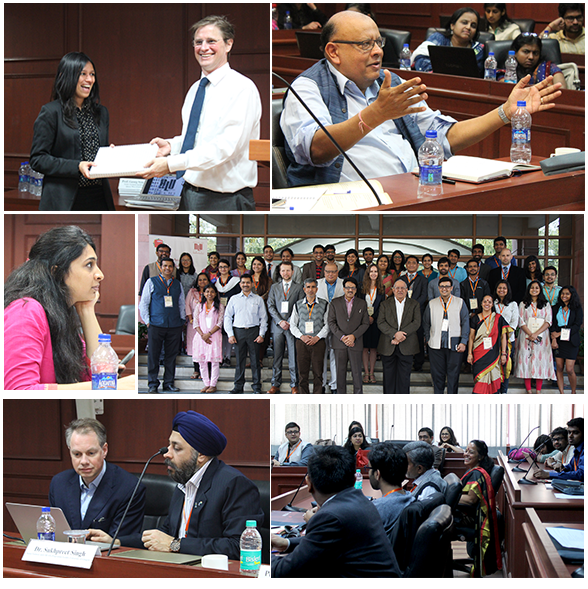CREATe Fellow Dr. Georg von Graevenitz, and, CREATe Programme Leader Dr Sukhpreet Singh, were recently invited to speak at the First Asia-Pacific Workshop on Empirical Methods in Innovation, IP and Competition organized by the National Law University (Delhi, India). This post by Georg summarises CREATe’s contribution to the workshop.
The First Asia-Pacific Workshop on Empirical Methods in Innovation, IP and Competition was held at National Law University in Delhi in early March 2017. The workshop brought together researchers and regulators from across the globe as well as academic participants from across India and South East Asia. Sessions focussed on the economics of IP law, the link between competition and IP law, regulation of competition and empirical research on effects of patents, trade marks, copyright and alternatives to IP.
Whenever economists and lawyers meet to discuss the intersection of law, IP and competition there is the challenge of bridging the gap in methods applied by them to researching how the law affects choices made by innovators, firms and consumers. Added to this is the challenge that the evidence base provided by social scientists is heterogeneous – political scientists, sociologists, quantitatively trained lawyers and economists all contribute and often are not aware of parallel research going on in the other disciplines.
Two CREATe team members were invited to participate in the workshop. Sukhpreet and Georg were able to draw on a number of new and free online resources to overcome these challenges.
CREATe has developed the Copyright Evidence Wiki, which currently contains information on almost 600 academic studies on copyright written by lawyers and social scientists. The wiki provides links to these studies and summaries of their content. Crucially for our audience in South Asia, it also allows the user to visualise the links between the studies, the topics and industries these studies focus on and their methodological basis. Eventually it will allow researchers to build bibliographies and interrogate the findings of the studies. Efforts to open the wiki to the community of researchers (who can propose and add new studies and comment on ways to analyse the underlying data) are ongoing and CREATe is keen for involvement of researchers around the world to improve and develop this unique resource. This wiki should mean that the days in which researchers provided only partial reviews of the literature on copyright related topics will soon be over.
A large part of the session on copyright law was devoted to showing participants how the wiki functions and how it can be used to provide new empirical insights into the body of work already contained within the wiki. Next, we picked out two studies to illustrate recent research on the economic effects of copyright protection. To introduce the economic approach to copyright protection to non-economists we drew on CORE (Curriculum Open-Access Resources for Economics). CORE is an initiative seeking to produce high-quality resources for the teaching of economics through a global collaboration of scholars. CORE’s free e-book, The Economy, contains a capstone unit on Innovation, Information, and the Networked Economy.
Crucially for our purposes this unit contains a video in which Petra Moser discusses innovation and copyright protection in the context of opera. Petra and her co-author Michela Giorcelli have produced a working paper on Copyrights and Creativity, which focuses on how copyright introduction in northern Italy spurred a period in which more and better operas were written in that part of Italy. This study, which is also part of the wiki, uses a difference-in-differences approach. This method is fortunately simpler and clearer than many other methods that economists often have to use. One of Petra’s big contributions to economics is that she finds historical data that is amenable to this type of economic analysis. She finds natural experiments with the help of which a clear causal inference may be drawn – here about the effect of introducing copyright and about extending its duration. By discussing the results obtained by Petra and Michela we were also able to contrast with an earlier presentation of work on trade mark cluttering, where the same method was applied, but where the underlying natural experiment being analysed is not as clean.
Further development of CREATE’s Copyright Evidence Wiki and of CORE’s materials for social science students, via a recent grant, should help participants of this and future similar events to learn about the economic and other effects of copyright protection in ways that are fun and enlightening at the same time.
This post first appeared on Business Analytics, Management and Economics on 18 March 2017 and subsequently on the CREATe blog on 20 March.
(Image courtesy: www.ciipc.org)
